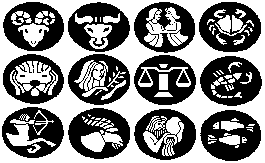 ASTROLOGY!
ASTROLOGY! 
 ASTROLOGY!
ASTROLOGY! 
Astrology is almost certainly the oldest and
today among the most frequently encountered of all
pseudosciences. Its conceptual origins can be traced back to the
first half of the Hammurabi dynasty in Babylonia about 3,500
years ago, yet most daily papers today have an astrology column.
In its “modern” form, astrology still asserts that the positions of the sun, moon, and the five planets known in antiquity (Mercury, Venus, Mars, Jupiter and Saturn) at the time an individual is born are somehow correlated with his or her personality, activities, preferences, and even major life events (accidents, marriages, divorces, etc.). Want to know the best day to ask for a raise, go to the dentist, get your hair done, or take a laxative? Consult your horoscope! There is no general agreement among astrologers as to how or why this can be. Nor is there agreement as to precisely which planetary positions lead to which specific individual traits or experiences. In fact, it is almost certain that no two astrologers will “cast” an individual's horoscope with the same result. The predictions are often so vague that verification is impossible. For instance, just when (and what?) is the dawning of the Age of Aquarius?
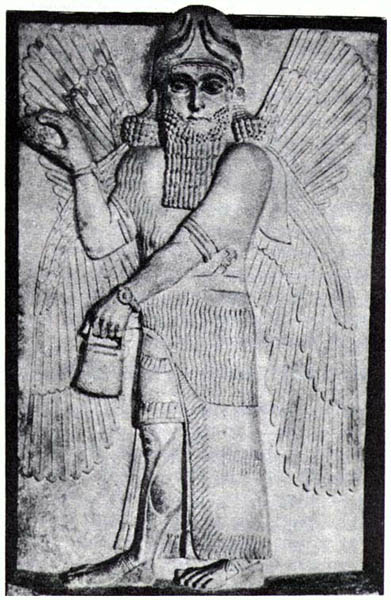 |
Astrology is best understood by learning how it began. Like most urban yet agricultural peoples of the day, the Babylonians had a pantheon of many gods. They also had a well-developed science of observational astronomy, which served the highly utilitarian purpose of providing a calendar— times to plant and to harvest, as well as times of religious festivals, etc. In this observational scheme each bright planet was important, and the priests whose task it was to make the observations naturally named the planets for the gods in their pantheon— Marduk, Isthar, Nergal, etc. It was a fateful naming. By about 1000 BC there was an extensive Babylonian literature of “planetary omens” based entirely on the arbitrary names of the planet-gods. Since Nergal (Mars) was the god of war, a summer in which red planet Nergal shone down brightly from the sky was a good time to wage war (or a time in which risk of war was great). Since Ishtar (Venus) was the goddess of love, a spring night in which Ishtar shone brilliant and high in the West after sunset was a good time to make love, or go looking for love. |
By about 600 BC the Babylonians had devised the twelve-sign zodiac: markers in the sky along the ecliptic, the apparent path which the sun, moon, and five naked-eye planets— Mercury, Venus, Mars, Jupiter and Saturn— appear to follow in their apparent motion across the sky. The “horoscope,” a crude earth-centered chart of the positions of the planets along the zodiac at a given moment of time, was devised soon after. The oldest known horoscope was made for April 29, 410 BC; historically, this is the true beginning of astrology. During the classical era dominated by first Greece and then Rome, Babylonian astrologers (called “Chaldeans”) set up shop in most of the large urban areas throughout the civilized world. Greek astronomers scoffed at the Chaldean cultus as a ludicrous combination of primitive astronomy and primitive religion, but to no avail— the Greek and later the Roman public embraced astrology as lovingly as they embraced most of the other bizarre and barbaric cults that wandered toward the shores of the Mediterranean looking for converts. That astrology makes no sense with its Babylonian religious underpinnings removed was apparent to thinking people from the very first. Roman statesman Marcus Tullius Cicero (106 - 43 BC) wrote, in 44 BC, a devastating critique of astrology, which is well worth reading today. Among the points made by Cicero was that no one sees or expects any correlation between the weather conditions at the time of birth of a child and the child's later personality or fortunes. Yet clearly the weather— extreme cold or heavy rain or harsh heat— has far more effect on a living thing than dim lights in the night sky. And even if all children born in December were similar in some way— which they are not— how would an astrologer know that these similarities were thus not due to the weather, due to all the children being born into a cold environment, rather than to the environmentally meaningless situation of the sun being in “Sagittarius,” or whatever?
Astrology such as we have today really originated at the ancient world's closest equivalent to a university, the great Library of Alexandria. Here scholars of what we would now call pseudoscience performed a synthesis of star-lore from several cultures, Babylonia still dominating. By about 1 AD the dogmas of astrology had reached a state that has not further evolved or developed in any significant way since, despite the incredible advances in astronomy in particular, and science in general, since the late 1500s.
|
With the coming of Christianity, the Chaldeans had hard going, since the early Christians (like the Hebrews before them) had the typical bumpkin's intolerance of all other gods and religions. And of course, there was no way to disguise the essentially religious underpinning of astrology. During the early Middle Ages, astrology nearly became extinct in Europe, but was kept alive along with the rest of prominent Greek and Roman cultural artifacts, by Islamic scholars. |
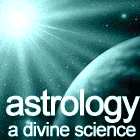 |
The Crusades brought astrology back to Europe where it co-existed very uneasily with Christianity until the dawn of the age of science. Influential theologian Giovanni Pico della Mirandola, count di Concordia (1463 - 1494), despite his openness toward Greek philosophy and the Hebrew Kabbala, attacked astrology as merely a primitive religion with logically incoherent dogmas, incompatable with Western religious concepts, and with contemporary facts of astronomy. The explosive growth of scientific astronomy from 1600 AD onward paralleled an equally explosive decline in the fortunes of astrology. If the planets are worlds more or less like the earth, astrology makes no sense whatsoever, because the only planet close enough to affect us in any specific way is the earth itself and we can completely forget about all the others. By 1900 a French encyclopedia accurately described astrology as a vanishing cult with no young adherents. Yet, nevertheless, astrology made the strongest comeback in all its history in 1930 when British astrologer R. H. Naylor (1889 - 1952) first developed the now-familiar daily newspaper astrology column, based for simplicity entirely on sun-signs, that is, on the position of the sun along the zodiac, ignoring the planets. The paradoxical result is that the heyday of astrology occurred not during the benighted Middle Ages, when the average person was sunk deep in ignorance and superstition, but rather in the 20th Century, when the typical citizen presumably knew some of the basic facts of astronomy and was aware that the planets are indeed worlds similar to the earth rather than mystical god-fires in the sky.
Thus, at least 90% of all Americans under age 30 claimed to know their sun-sign in the 1970s. The percent of adults in the US who currently think “astrology is true” ranges from 37% to 25%, depending on which poll you look at, but if the question avoids the word "astrology" and refers instead to "sun signs" or "horoscopes," the percent of Americans who think these things are valid rises to just under 50%. The percent of Americans who read their newspaper horoscopes at least occasionally is about 45%. The number of people who list themselves as professional astrologers is from 3 to 10 times the number of professional astronomers. An estimate of the amount spent annually by Americans on astrology-related junk is far in excess of $1 billion.
Scientists have sometimes been quite baffled, not to say horrified, by the continuing popularity of astrology, and a number of them have taken the time to carry out careful studies to see if there is any actual correlation between planetary positions at birth and any attribute of the individual in later life. No statistically valid study has ever shown any connection that would give any validity to any astrological concept— no matter how vaguely that concept has been worded! There is no question or controversy about the simple fact that astrology does not work.
 |
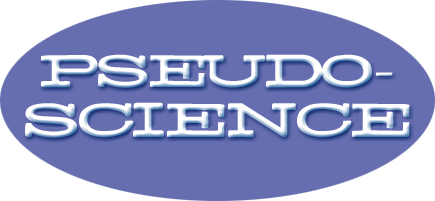 |
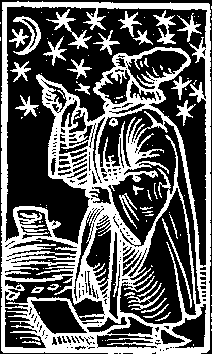 |
Nor is there any reason why it should work. In order to go from an individual's horoscope to a specific prediction of what is in store for that individual, the astrologer must consult a number of tables. These tables correlate features of the horoscope (positions of the planets, etc.) with individual attributes (intelligence, affection, physical strength, good health, etc.). Now, just where did these tables come from? [Note that it is such tables, and not the horoscope itself, that constitute the real “guts” of astrology.] It turns out that these tables are simply made up “intuitively” by whoever wrote the particular manual of astrology being used, or made up by an earlier author being used by the current author as a reference. This is why two astrologers will in almost every case arrive at different (often explicitly contradictory) predictions from a single horoscope. There are numerous quite different “astrological systems”; all imaginary, all arbitrary, and all completely disconnected from any aspect of reality or any method of verification.
This arbitrariness is a characteristic of all pseudosciences, and results because the origins of pseudosciences lie not in observation of nature, but in accidental historical conventions of human culture. For example, the ancients happened to call the second planet from the sun Venus and the fifth planet from the sun Jupiter. If they had done it the other way, it would not have made the slightest difference to astronomy. Venus would then be the big planet with colorful belts and a red spot, while Jupiter would be a hellishly hot planet about the size of the earth. But astrology would then be totally different, because astrology depends entirely on the characteristics associated with the name, not the actual planet! Jupiter, chief of the gods, is a leader of men. Venus, goddess of love, rules the emotions. Changing the arbitrary names would leave reality unaffected but astrology, horoscopes, etc., would become totally different. [It is interesting to note that the central American civilizations, Mayans, Aztecs, Toltecs, Olmecs, etc., identified the planet we call Venus with the serpent-god, Queztalcoatl!]
|
Another way to appreciate the total
arbitrariness of astrology is to consider the zodiac.
The Babylonians, with their interest in the calendar,
naturally had 12 zodiacal signs. But again this is a
matter of choice; there are not 12 or any other number
of divisions anywhere in the night sky! Other cultures
used 28 signs, for instance the Chinese and Hindus. The
Toltec cultures of Middle America used 20. The
Babylonians themselves used from 6 to 18 before settling
on the “traditional” 12. Again the arbitrary choice of
number of signs (not to mention names of signs) is
obvious. As for the names, if a given area of the night
sky was called “Aries, the Ram,”, instead of, say,
“Sammy the Sheep,” this arbitrarily chosen name then
predetermined the “interpretation” in the tables— for,
since Rams are aggressive and assertive, at least in
folklore, so will be people born with the sun (or
something) in Aries. How one distinguishes the
aggressiveness of the Ram from that of the goat
Capricorn or the bull Taurus or the lion Leo or the
scorpion Scorpio is another problem! If these random
groupings of stars or areas of the sky had been named
“The Chair”, “The Writing Desk”, “The Door”, “The Stove”
and “The Castle”, interpretations would again be
unrecognizably different. And even in 600 BCE, Greek
astronomers had named dozens of other constellations
whose borders overlap the zodiac... all completely
ignored by astrologers. |
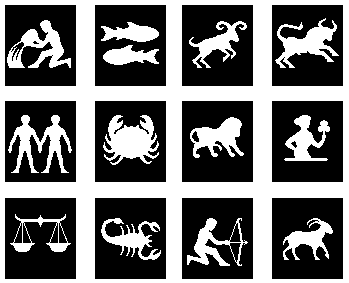
Do you see faint grey spots between the black zodiac plaques? These spots are as imaginary as the successes of astrology. |
As another example, consider the so-called “house system” of astrology. This is yet another completely arbitrary system created so that the horoscope will depend not just on the day of birth, but also the time or specific location of the individual at birth (at least within plus or minus 2 hours and plus or minus 2000 miles!). The houses are arbitrary divisions of the sky into 12 sectors, vaguely like orange slices, with the eastern edge of the first house usually aligned with local sunrise, in order to provide yet more tables with more individual characteristics to be looked up. Astrological lore has put forward over the past 2000 years many different (about 50!) house systems, and most astrologers are dimly aware of at least 20 completely different systems. The various systems differ most often in how the axis of the slice system is oriented relative to the ecliptic, the horizon or the equator. In interpreting horoscopes, the 12 house divisions are generally given equal weight with the 12 zodiac divisions. [There are two house division systems in use by modern astrologers, the Koch and the Placidian, tilted such that anyone born above 66.5 degrees north latitude does not even have a horoscope! The stars apparently have nothing to say about the destinies of around 16 million people!] Nearly every one of the different house systems results in a completely different horoscope for an individual! An example of such differences, provided by an astrologer, is given here.
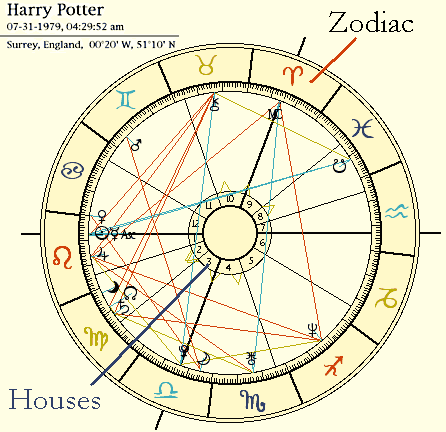
The four basic Babylonian calendar points are still important in astrology— among these are the vernal (spring) equinox and the autumnal equinox, where the plane of the ecliptic (the approximate plane of the solar system) crosses the projection onto the sky of the earth's equator... on these two days in the year, day and night are of equal length. The other two important points are the summer solstice (the longest sunlit day in the Northern hemisphere), and the winter solstice (the shortest sunlit day in the Northern hemisphere).
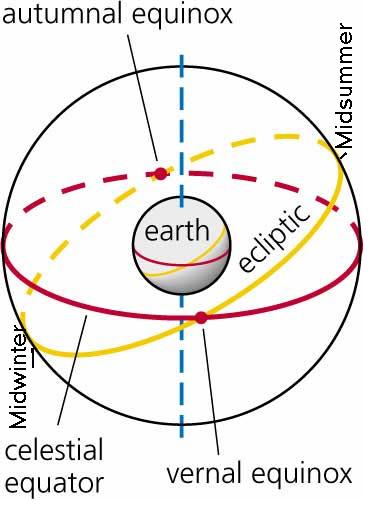 |
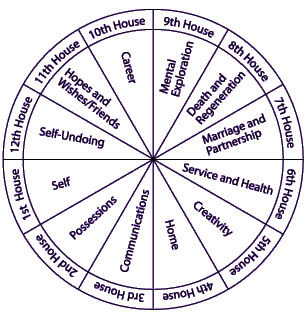 A simple house look-up table |
This leads to another hilarious aspect of astrology, due to the astronomical phenomenon known as the precession of the equinoxes. This effect was known to Greek astronomers by 150 BC and may have been known much earlier— and, it completely destroys the framework of astrology. The problem is that in 2000 BC the equinox was in Taurus, but the astrologers circa 300 BC - 1 AD, for whom the sun then rose at the edge of Aries at the spring equinox, defined one boundary of the sign of Aries to be the sky-marker of the spring equinox. But as the ancient Greeks astronomers knew, because the earth's spin axis precesses in a circle about a line perpendicular to the plane of the ecliptic, the equinox swings in a great circle, taking about 26,000 years to complete its cycle. Thus, today, the official sign of Aries is nowhere near the constellation Aries! This detachment of the meaning of the symbol from the random scatter of stars whose arbitrary name originally gave the symbol its name and significance is ludicrous even to many astrologers, who thus disagree with all other astrologers by keeping the sign fixed to the constellation instead of letting it move with the equinoxes!
Astrologers have borrowed many terms from scientific astronomy, and have added many others, so that modern astrology has a vast and impressive nomenclature... cusps, ascendants, descendants, etc., etc., etc. The elaborate nomenclature is designed to impress potential customers with the validity of astrology. Surely, with so many confusing technicalities, it's just like real science, and must in fact be "real" science too, right? Some of the borrows from astronomy are hilarious. For example in modern astrological material on the internet, one often reads of the horrors of "retrograde." If (insert name of planet at random, but usually Mercury) is in retrograde, that means whatever is going wrong in your life is "explained" by that "fact." Retrograde motion of other planets as seen from the earth is merely a perspective issue... seen from earth, a given planet seems to move in a loop during part of its stately progression along the zodiac. The reason is that the earth, moving faster in its orbit, catches up with and passes the outer planets, which move along their orbits at much slower speeds. And the two inner planets, Mercury and Venus, move faster in their orbits than the earth, and thus catch up with it and pass it. Nothing to see here, folks, other than that all the planets are orbiting the sun.
The moral is that when one has a system based on randomness and arbitrary convention, a shuffle or mixup of the system is undetectable. Astrology is just a random-word generator, and mixing up the procedure by which the random words are generated is not detectable, since the output words remain random with any genuine further mixup. The puzzle is how anyone could not be aware of this randomness, of the mindlessly made-up conventions that crucially determine the nature of astrology's “predictions.”
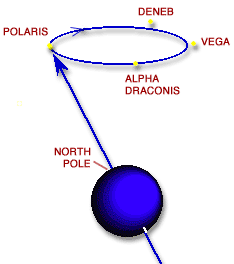 Precession |
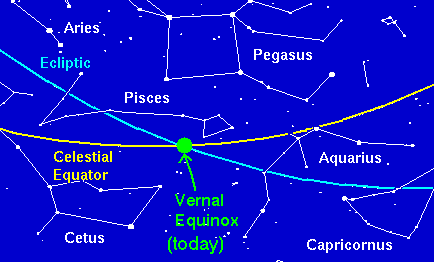 |
The question of why people believe in astrology is far more interesting than the random interpretive details of any horoscope. Psychologists have shown that customers are satisfied with astrological predictions as long as the procedures are individualized in some rather vague way. For example, if the astrologer asks for a great deal of personal information before providing the prediction, the individual is much more satisfied with it than if the astrologer asks relatively few questions (and provides the same prediction). This request for specific personal information is the ritual of personalization needed to “sell” predictions that are in fact generic rather than personal. That is, the predictions themselves are typically very vague, stereotypical and universal in applicability; they might accurately describe nearly anyone alive.
The rhetoric of astrological readings tends in fact to be avuncular rather than predictive, that is, to consist of vague, generic advice rather than vague, generic prophecy. Actual example: “Shake up your normal day-to-day activities. Skip the mundane— grab the gusto! Be alert to new opportunities that may arise later today. Could you use a new home furnishing? Next week might be a good time to shop. Taking stock: it's not just for financial advisors. How are you doing with your life goals? Are there some old plans that need dusting off, or bold new ones that need to be put into motion? Stop hanging out with the same old crowd. It takes effort to meet new people, but that effort might be rewarded by a new friend who turns out to be the best friend of your life!” There is no way in which such “readings” could be considered either right or wrong.
Astrology relies on illusions in thinking
variously called personal validation or subjective
validation, or the Forer Effect. More
specifically, the Forer
Effect is the tendency of us all to interpret vague,
generic statements as explicitly, individually descriptive of
ourselves. More generally, the fallacy of subjective
validation depends on the selective nature of memory. If we
want to believe something is so, we tend to remember the
events that support the belief, and forget those which don't.
The result is a growing feeling of conviction. Given a generic
“reading” which would apply to most people, we remember the
part of the spiel that accidentally can be made to fit us and
forget about the majority of the parts, which don't. Given
five or six vague predictions (or more often suggestions) for
each of 365 days, we remember the one or two which happen by
sheer chance to relate fuzzily to real events, and naturally
and immediately forget the many thousands which turned out to
have no relevance of any kind whatsoever.
Modern science has undercut astrology at every turn. The (molecular, cellular) individual is formed at conception— not at birth. And what if the birth is due to medically induced labor, or even Caesarean section? The gravitational force exerted on a newborn baby by the earth is more than a million times greater than that of any nearby celestial object. The tidal forces exerted by the mother, or delivering doctor, or hospital building is, likewise, a million times greater than that of any nearby celestial body. The electromagnetic radiation falling on the baby from the room lights is a million times more intense than that from any night-sky celestial object. Changes in environment during early development are clearly observed to have much greater effects upon the developing person than trivial details of circumstances at the time of birth. Also, the time of birth can be altered, to some extent, by the actions of a physician. What are the astrological implications of a caesarean section or induced labor? Another important point to appreciate involves the long-established role of genes in a person's nature. Suppose two unrelated persons are born at the same time in the same hospital. Will the supposed astrological forces outweigh the real genetic ones? The science of genetics has shown the answer to be, unquestionably, no. There is nothing whatsoever in all of nature as we have explored it to date, or in any of our other experience, that gives any credibility to any astrological idea. If there were any actual phenomena of nature underlying astrology, everything would be affected, not just human beings. The forces of nature are universal, exerted from atom to atom, and everything is made of atoms. Real forces do not discriminate between living and non-living matter. But, of course, no knowledge of modern science is required to see most all of astrology's problems— as Cicero pointed out 2000 years ago, consider a battle in which thousands take part and hundreds are killed. Were all those killed born on the same day of the same month? Hardly. In fact, if the number of fatalities is large enough, the distribution of their birthdays will always be quite uniform throughout the y365-day year.
Nevertheless, millions of Americans, from the late Ronald Reagan to minimum-wage earners, have regulated their daily schedules (to some extent) in accord with the arbitrary and potentially harmful advice of astrology's random-word generating engine. Why? Astrology is probably the longest-lived pseudoscience because of its personal aspect. Every day you can pick up the local newspaper, turn to the astrology column, and read about yourself! Not Donald Trump, not Jennifer Aniston, not Oprah Winfrey, not Taylor Swift, nosiree, but you, you, you! It's really all about you— the whole, infinite universe is reduced to a primitive clockwork whose sole purpose is apparently to tell you whether it's a good day to go shopping or not! It is essential to remember that a belief doesn't have to be true to be apparently useful. Astrology has flourished because it provides a framework within which people can label themselves, discuss and accept their strengths and failings, and search for meaning and direction in their lives. Viewed as a social support system, astrology lies somewhere between a religion and a self-help cult, and poses all of the same dangers. If you can get around without a crutch, why persist in carrying one everywhere and waving it at anyone you meet?
Astrology is the classic pseudoscience, a model for most that came after. For those for whom astrology is too complicated, simplicity is on the way... it's not your star signs that are important, you only need to worry about whether the moon is full or not! Today, astrology has tended to submerge itself in the general New Age social movement, and has been blended, often nearly indistinguishably, with other New Age pseudosciences, from Feng Shui to crystal power, from dowsing to medical quackery, from auras to near-death experiences.... Some practitioners of astrology classify it as an “intuitive art,” and both admit to and revel in its apparent randomness and arbitrariness. The idea is that the astrological predictions, generated by an admittedly meaningless procedure, are still valid because the framework used for the predictions is unimportant, and they actually come ultimately from psychic insight into the customer's condition and needs... just like, for instance, Tarot card reading! This attempt to escape the criticism of astrology's incoherent foundations flounders on the hard, cold fact that no two astrologers will generate the same predictions and specific personality readings for the same customer. So much for “intuition!”
Originally written by Prof. Rory Coker of the Physics Department, University of Texas at Austin, and revised by him and others since. Latest update: September, 2007.
Selected Internet Resources on Astrology:
Astrology and Science | Astrology and Astronomy | A succinct analysis of Astrology. The “Bad Astronomy” website's analysis of astrology and pseudoscience is here. A recent (2003) and very direct test of astrology, with very good statistical significance (N = 2000).
A still more recent test of astrology, from 2006, with extremely good statistical significance (N = 15,000).
Other tests of astrology: here, and here, and a useful summary here. A short but effective analysis of astrology. When the predictive power of astronomy is compared to the imaginary "predictive" power of astrology, the score is astrology, zero! What precisely do astrologers mean when they say "astrology works," when in fact it fails every imaginable test, not only scientific tests, but even tests of logical consistency? Here's an interesting analysis. Fraudtech.com's entry on astrology. Was Isaac Newton an astrologer? No. An astronomer's page on astrology. Another on-line debunking of astrology. If you were a moron, what would your opinion of astrology be? Try guessing before hitting the link. A video of a standard astrology-themed demonstration of the Forer Effect, narrated by James Randi. Bill Nye on astrology. Carl Sagan on astrology. Einstein on astrology, a completely bogus "quote" and an actual letter. A brief but effective debunking.
